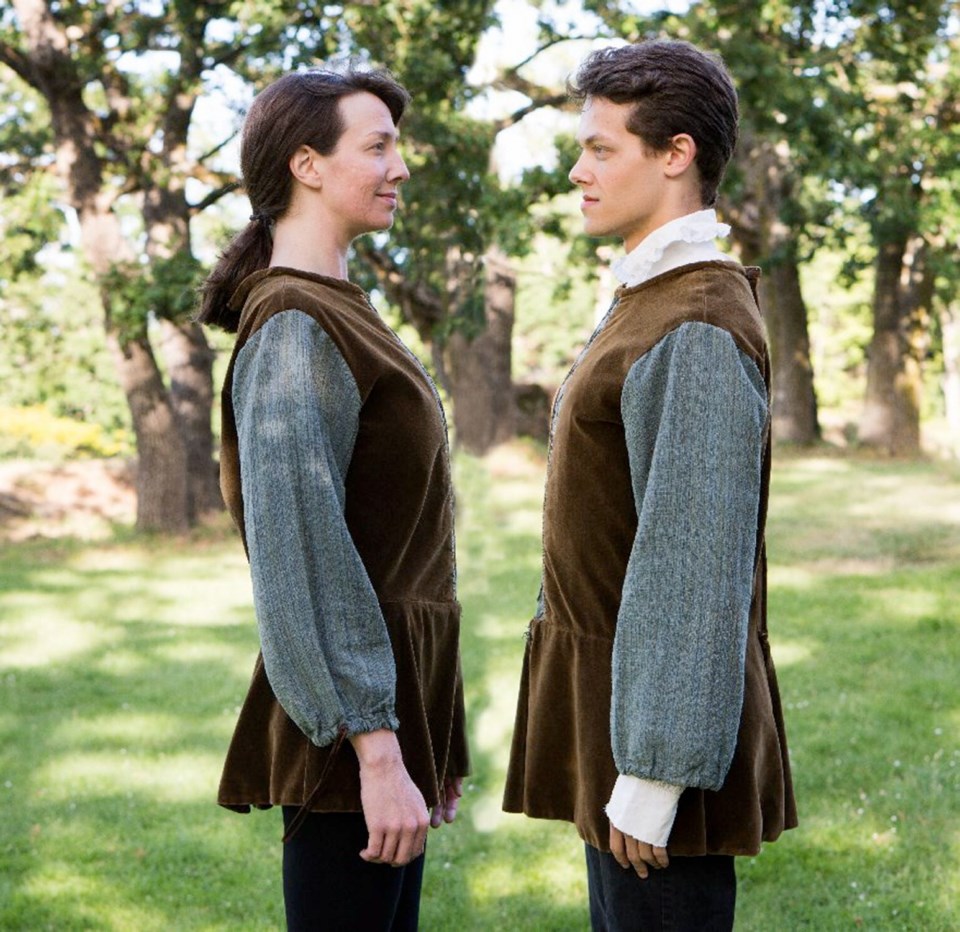Twelfth Night
Where: Camosun College grounds, Lansdowne campus
When: To July 30
Rating: four (out of five)
These days, it can be almost an act of aggression to insist some things are either male or female. As the LGBTQ community reminds us, we live in the age of gender blurring and shifting sexual identifies.
An enjoyable new production of Twelfth Night from the Greater Victoria Shakespeare Festival appears to capture the prevailing zeitgeist. In this version, directed by Janet Munsil, all male roles are played by women, with the female roles being played by men. This is simultaneously entertaining and perplexing … but hey, that’s 2016 for you.
If some who attended Friday’s performance were befuddled by the gender-juggling, at least they left refreshed. In mid-play we were treated to a shower, from which we took temporary shelter in a nearby building. And then, for the last five minutes of the show, actors and audiences were subjected to a torrential downpour. During this, Maria (Geoffrey Ewert) climbed a rocky hill, seized an electric guitar and started playing the Kinks’ Lola, a song celebrating transgenderism. The entire cast, meanwhile, did a celebratory synchronized dance.
Although I’ve been reviewing theatre for three decades, monsoon-rock-and-roll-gender-bending-line-dancing Shakespeare is a first for me. Given the rain, I was worried Ewert might be electrocuted in the manner of Leslie Harvey from Stone the Crows. My companion found it all exhilarating, though, and even said she felt cleaner afterwards. At home, after changing clothes and slathering my arms with soothing After Bite, I had to agree (yes, there are mosquitoes, however, the GVSF generously supplies bug repellent).
Twelfth Night is one of Shakespeare’s most popular comedies. The plot is familiar. Viola is shipwrecked and loses touch with her twin brother Sebastian. Given the circumstances, she does what anyone would: disguises herself as a boy named Cesario. This later leads to humorous problems with Countess Olivia, who becomes enamoured with Cesario. Meanwhile, because Viola/Cesario looks exactly like her twin, further havoc ensues with when the pair are confused for each other. There are duels that go (amusingly) wrong, imagined betrayals and so on.
In this GVSF interpretation, set in the 1600s, having boys play the girls and vice versa tilts the wonky world of Twelfth Night even further. Munsil’s notion is that it’s merely an extension of the role-reversal and gender confusion that exists within the play. As well, males played all the female roles in Shakespeare’s time, so why not take it one step further by having female actors play the men?
Some will find this delightful. And it is fun to a degree, although I suspect it creates new problems. For one thing, Twelfth Night’s plot — with all its farcical misunderstandings — is already potentially confusing. Adding a new layer of gender-switching doesn’t help. There is, for instance, the situation of Will Carr (a good actor) as Viola. Here we have a man playing a female character who’s pretending to be a man. Add to this the obliqueness of Shakespeare’s language for the modern audience and you have the makings of a real muddle.
Still, there’s plenty of worthwhile things happening in this show, which on a cloudless evening would be even more of a pleasure. The cast, a mix of community and professional actors, is a good one. As Malvolio, an appropriately pompous Karen Lee Pickett drew enthused applause during the famous yellow-garter scene. Trevor Hinton, in an ornate black ball-gown, was an amusingly coquettish Olivia. Madeleine Humeny truly made Sir Andrew Aguecheek her own with a kooky comic portrayal. Also notable: Ewert, Susie Mullen as Sir Toby Belch and Joanie Papillon, who sang and acted well as Feste the fool.



